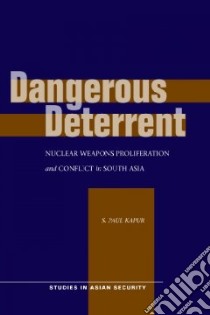Dangerous Deterrent - 9780804755504
Un libro in lingua di Kapur S. Paul edito da Stanford Univ Pr, 2007
- € 26.20
- Il prezzo è variabile in funzione del cambio della valuta d’origine
Arguably, tensions between the two nuclear powers India and Pakistan present the greatest danger of nuclear warfare present in the world today. Yet some theorists have suggested that nuclear weapons in the hands of these South Asian states should lead to greater security through mutual deterrence. Kapur (strategic studies, US Naval War College) discounts these theories, arguing that South Asia has, in fact, become less stable and more violent since the acquisition of nuclear weapons by Pakistan and India. His theory for why this is the case suggests that the militarily weaker Pakistan, believing itself to now have a deterrent to Indian conventional superiority, is now encouraged to take aggressive action concerning the territorial dispute over Kashmir. India, heretofore satisfied with the Kashmir status quo, is then motivated to engage in more forceful anti-Pakistani behavior, both in response to Pakistan's Kashmir activities and to demonstrate that they can't be intimidated by Pakistani nuclear brinkmanship. Nuclear proliferation has thus led to an increase in conventional violence primarily because of the incentives for aggression that proliferation can create for weak, revisionist states. Annotation ©2007 Book News, Inc., Portland, OR (booknews.com)
Informazioni bibliografiche
- Titolo del Libro in lingua: Dangerous Deterrent
- Sottotitolo: Nuclear Weapons Proliferation and Conflict in South Asia
- Lingua: English
- Autore: Kapur S. Paul
- Editore: Stanford Univ Pr
- Collana: Stanford Univ Pr (Paperback)
- Data di Pubblicazione: 07 Marzo '07
- Genere: POLITICAL SCIENCE
- Argomenti : Arms race South Asia Nuclear weapons South Asia Nuclear nonproliferation South Asia
- Pagine: 262
- Dimensioni mm: 228 x 152 x 19
- ISBN-10: 0804755507
- EAN-13: 9780804755504


